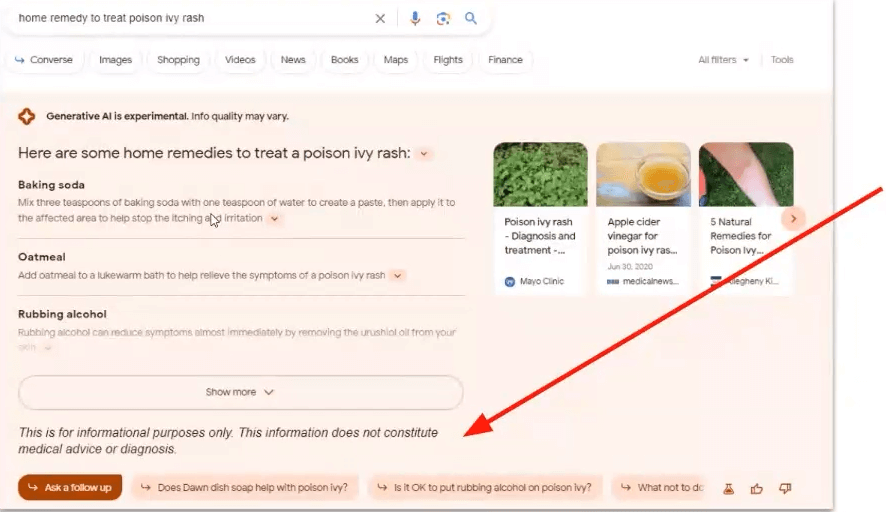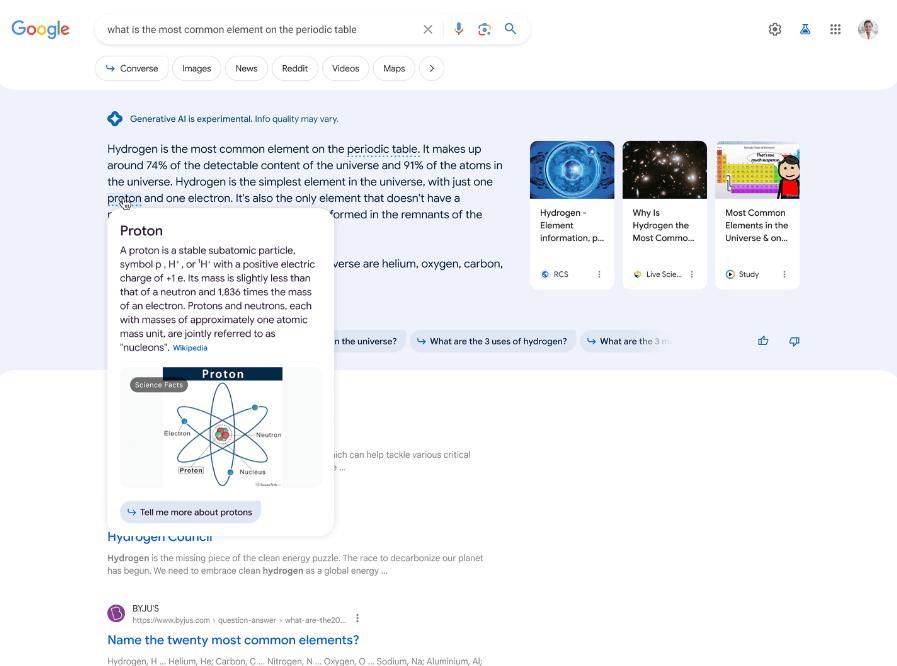In May 2023, Google launched a test version of its updated search engine – Search Generative Experience (SGE). It is powered by artificial intelligence (AI), which is intended to provide users with more accurate answers to their questions.
The experimental version is currently only available to volunteers from selected countries. However, it is assumed that after successful testing, Google will make it available to all users around the world. What do we know about SGE? Check the most important information and be ready for changes!
A new look for search results thanks to AI
The key element of the new version of the Google search engine is a highlighted field with an AI-generated answer to the user’s query.

As you can see in the example above, the query entered is quite specific and complex.
However, with SGE it is possible to obtain a tailored answer. In addition to the text, AI also provides links to the pages from which it was usually created.
This way, the user can go to a specific website to get more information about a particular topic.
The result itself is similar to the Direct Answer items we already know. What we can notice is that the SGE result lists up to 3 domains with the option of moving to the next ones. Currently, Direct Answer results are mainly based on one domain.
At the very bottom of the SGE result, the user will also find options that allow him to ask additional questions.
AI provides several suggestions, but thanks to the conversation mode, the user can also enter them themselves.
What about organic and paid search results?
- ads are usually displayed above the SGE result,
- organic search results are under the SGE result,
- The SGE result does not exclude the appearance of a featured snippet in the organic results.
Interestingly, in the case of queries that concern diagnoses, diseases or other medical-related topics, Google adds a note:
“This is for informational purposes only. This information does not constitute medical advice or diagnosis.”

Who can already use SGE?
The trial version of Search Engine Experience is currently available (September 2023) only in the United States, India, and Japan.
Residents of the last two countries gained access to it only at the end of August, almost 3 months after the tests began in the USA.
To be able to use SGE, interested users from the specified countries must sign up for Search Labs – a free program that allows you to test the latest Google search experiences.
What can we expect from Search Generative Experience?
According to Google, thanks to new, advanced technology we can unlock completely new types of questions that we did not expect that the search engine would be able to answer.
AI will also change the way information is organized on the Internet. It will help you organize them and give them even more meaning.
What exactly can we expect? Below we discuss some of the possibilities offered by Search Generative Experience.
Better-tailored answers to user queries
The current version of the Google search engine often does not provide satisfactory answers to more complicated and complex queries. In such situations, users have to break it down into smaller parts and then browse through the individual pages.
Search Generative Experience is designed to eliminate this problem. Thanks to AI, the user can find the answer to even a very specific question, e.g. “What food is best for a 3-year-old Maltese?”
Some AI-generated responses also contain expandable arrows. After clicking on them, the user will find the source of the quoted answer or additional information, such as reviews or opinions of other people.
Conversation mode
As we have already mentioned, the SGE results allow us to ask additional questions. The conversational mode is based on context transferred from question to question. Thanks to this, the user receives consistent answers based on a specific topic. ChatGPT also works on this principle.
In this mode, AI generates teasers leading to content on other websites, as well as a range of information that can be better read.
The “conversation” conducted with the search engine allows the user to be provided with more personalized answers and sources that they might not be able to access using traditional search methods.

Making purchasing decisions with the help of AI
SGE also aims to make it easier for users to compare products and make purchasing decisions.
After entering a specific query, e.g. “Bluetooth speaker for a pool party”, the SGE result will provide the user with the necessary information on what to pay attention to when choosing a specific product.
Additionally, AI will prepare a list of proposed speakers along with price, specifications, customer ratings, and links to purchase. Thanks to the information and suggestions obtained, the user can make a more informed decision. However, if he is not yet convinced, he can use the suggested follow-up questions.

More understandable definitions
Another interesting application of SGE may be to generate more friendly definitions.
Google understands that when searching for an explanation of a concept, a user may come across a term that they don’t understand or simply want more information about.
Therefore, for inquiries related to, among others: science, economics, or history AI generates answers containing additional information.
The user can hover over specific words to preview their definitions or see related diagrams and images.

First conclusions about Search Generative Experience
So far, Google has revealed that the highest level of satisfaction with SGE is observed among younger users (aged 18-24), who say they like the ability to ask additional questions in conversational mode.
Other users also agree that they find the suggested follow-up questions in the SGE field useful and allow them to see how they can narrow and refine their searches. Artificial intelligence can help them find what they are looking for faster.
Additionally, Google has found that ads placed above or below AI-powered results are further helpful by providing users with useful options to take action and connect with businesses.
How will SGE affect SEO?
One of the hottest topics among SEO experts is the impact of the new version of the Google search engine on website positioning. So far, Google has not commented on this matter, but users have begun to come to certain conclusions themselves.
It has been noted that SGE responses are typically generated from sources from the first Google search results. This means that website optimization is still extremely important.
In the context of SEO, original expert content will become a key issue. To be included in the SGE result, duplicate information is not enough – it is worth focusing on adding unique opinions and new observations. The results generated by SGE will be based on content that ranks for given queries, and the SGE layout itself will show websites from which you can learn more about a given topic.
If you want to be cited by Google, you also need to ensure that your headlines are clear and that they provide direct answers to possible user questions. FAQ sections that exhaust the topic covered are a good idea.
Recommendations from users are also an important element. SGE takes into account opinions available online, which is why independent reviews and ratings issued on external websites will become important.
If you haven’t paid much attention to the content you produce, it’s time to change that. Low-quality content is unable to reach a wider audience. Google has been paying attention to this for years, but with the development of AI, it is an issue that is becoming even more important.
Wrapping up
Google has not yet announced an official release date for Search Generative Experience. However, we can expect that we will soon enter a new phase of intelligent search.
Even if the current version of SGE is not yet fully refined, Google constantly trains its models to make improvements over time and thus maintain a high-quality bar.
